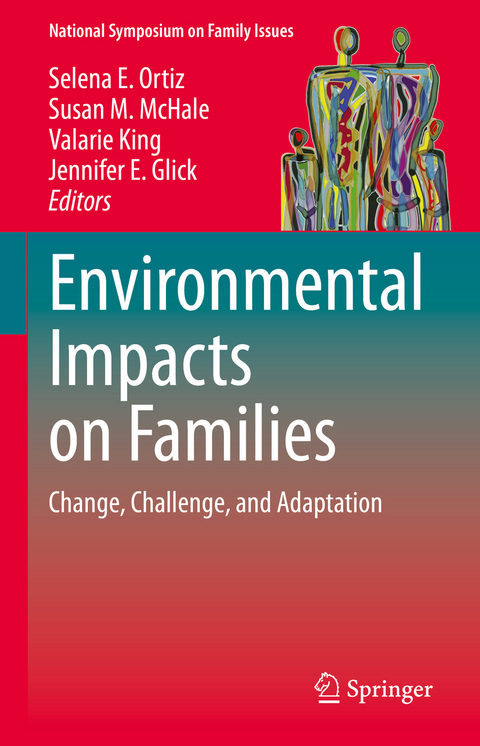
Environmental Impacts on Families
Springer International Publishing (Verlag)
978-3-031-22648-9 (ISBN)
Featured areas of coverage include:
- Extreme natural events and families' postdisaster recovery.
- Family adaptations to climate change.
- The builtenvironment and children's health and well-being.
- Community-driven approaches to address environmental inequities.
- The urban environment of family caregiving.
Environmental Impacts on Families is a must-have resource for researchers, professors, and graduate students as well as clinicians, therapists, policymakers, and other related professionals in developmental psychology, family studies, environmental health and policy, social work, public health, educational policy and politics, economics, migration studies, and all interrelated disciplines.
lt;b>Selena E. Ortiz, Ph.D., MPH, is Associate Professor of Health Policy and Administration, Demography, and Public Policy at Penn State. Dr. Ortiz's research focuses on health equity, population health, housing affordability, and social and health policies. This work is structured around two themes: the causes of unequal access to health services and the consequences for health outcomes and the determinants of health and social policy formation, support, and adoption. The unique stamp of her work is its theoretical focus on identifying processes of health inequity using diverse mixed-methods approaches.
Susan M. McHale, Ph.D., is Distinguished Emeritus Professor of Human Development and Emeritus Professor of Demography at Penn State. Her research focuses on children and adolescents' family roles, relationships, and daily experiences and how these family dynamics are linked to youth development and adjustment. Dr. McHale's research highlights family gender dynamics and the role of sociocultural practices and values in youth development and well-being.
Valarie King, Ph.D., is Professor of Sociology, Demography, and Human Development and Family Studies and an Associate of the Population Research Institute at Penn State. Her research focuses on intergenerational relationships across the life course and their implications for the health, well-being, and development of family members. Dr. King's most recent work focuses on elucidating the factors that promote the development of strong ties between children and their stepfathers, and the ways in which stepfathers can promote children's well-being.
Jennifer E. Glick , Ph.D., is Professor of Demography, Arnold S. and Bette G. Hoffman Professor in Sociology, and an Associate of the Population Research Institute at Penn State. Dr. Glick is a social demographer with expertise in migration, family processes and children's education and developmental trajectories. She has written extensively on the educational outcomes among children of immigrants in the United States and how migration alters family relationships and living arrangements.
Part I. Environmental Disasters and Impacts on Families.- Chapter 1. Impacts of Disaster-Induced Death and Destruction on Health and Mortality over the Longer Term.- Chapter 2. Evidence-Based Interventions for Children and Families During Disaster Recovery: Trends, Lessons Learned, and Future Directions.- Part II. Climate Change and Impacts on Families.- Chapter 3. Climate Change-Related Demographic and Health Research: Data and Approaches.- Chapter 4. Family Well-Being in the Context of Environmental Migration.- Part III. The Built Environment and Impacts on Families.- Chapter 5. The Built Environment, Family Processes, and Child and Adolescent Health and Well-Being.- Chapter 6. Equitable Change in Community Built Environments for Family Health: REACH River Rouge Project.- Chapter 7. How Family Caregiving Negotiates and Depends on the Urban Environment.- Part IV. Future Directions in Environmental Impacts on Families Research and Practice.- Chapter 8. Families in Context: Understanding Environmental Impacts on Family Functioning in Service of Resilience and Equity.
| Erscheinungsdatum | 01.02.2023 |
|---|---|
| Reihe/Serie | National Symposium on Family Issues |
| Zusatzinfo | XVI, 203 p. 20 illus., 16 illus. in color. |
| Verlagsort | Cham |
| Sprache | englisch |
| Maße | 155 x 235 mm |
| Gewicht | 455 g |
| Themenwelt | Geisteswissenschaften ► Psychologie ► Entwicklungspsychologie |
| Schlagworte | Bangladesh, trauma, environmental challenges, migration • Built environment, children, adolescents, health, well-being • Caregivers, siblings, peers, environmental challenges • Climate change, health studies, families, children, youth • Community built environments, family, interactions, processes • Crowding, chaos, family functioning, health, and well-being • Demographic outcomes, climate change, urban environments • Disaster-induced death, destruction, families • Environmental disasters, pollutants, impact, families • Environmental migration, families, youth, well-being • Equity, environmental disaster, toxins, families • Health, mortality, survival longevity, environment, families • Homes, parks, schools, play spaces, environmental design • Indian Ocean, tsunami, 2004, survivors, PTSD • Natural disaster, recovery, children, youth • Neighborhood development, community health, environment • REACH River Rouge Project, community built environments • Social, ecological, protective factors, postdisaster recovery • Social systems, family studies, migration, climate shock • Socioeconomic conditions, neighborhood infrastructures |
| ISBN-10 | 3-031-22648-8 / 3031226488 |
| ISBN-13 | 978-3-031-22648-9 / 9783031226489 |
| Zustand | Neuware |
| Informationen gemäß Produktsicherheitsverordnung (GPSR) | |
| Haben Sie eine Frage zum Produkt? |
aus dem Bereich


